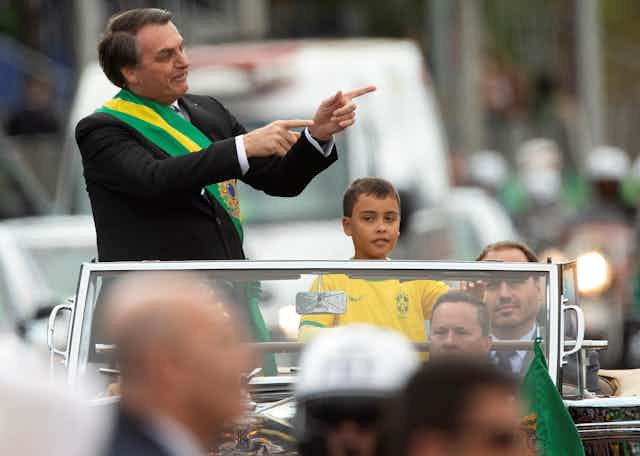A year ago, on October 28, 2018, Jair Bolsonaro was elected president of Brazil in an election that was as polarising as it was surprising. Since taking office in January 2019, his presidency has followed the path feared by many of his critics.
Bolsonaro’s government has been erratic, unable to build support, and rather than working across congress to pass legislation, the Brazilian leader has tended to antagonise his critics and play to his ultra-conservative, right-wing support base.
Bolsonaro has no doubt fanned the flames of Brazil’s political, social, and cultural tensions. He faced a considerable backlash within Brazil for his response to fires in the Amazon, and has been criticised for his nepotism and historic photos taken with high-profile criminal suspects. Ongoing instances of misogyny, homophobia, and racism – not to mention bizarre activity on Twitter – have contributed to further political and social polarisation.
Still, as we argue in our recent book Understanding Contemporary Brazil, Bolsonaro is not necessarily the cause of Brazil’s political polarisation, but rather a symptom of more deep-seated democratic problems.
Polarisation has long contributed to political fragmentation in Brazil’s congress, which currently has 30 political parties. This imposes high costs in terms of time and resources on any president who wants to fulfil his or her agenda. Brazil also remains a socially conservative country, prone to instances of sexism, racism, and indifference to protecting human rights. These factors lie at the structural and cultural roots of the current political polarisation in Brazil, and recently they have started bubbling to the surface.
Conditions for victory
So, if these issues were latent in Brazil for decades, what explains their recent emergence, bringing about the election of a right-wing extremist like Bolsonaro?
First, it’s worth remembering that if former president, Luiz Inácio Lula da Silva were not in prison, it’s likely he would have won the election. And, second, despite widespread anger at Lula’s Workers’ Party over political corruption – a factor crucial for explaining the election result – Bolsonaro is not all that popular in Brazil.
According to the most recent polls, only 31% of Brazilians think he is doing a good job, and 55% “do not trust” the president. All this suggests that what might really be growing in Brazil is frustration with politics more generally, including anger against the political system.
Related to this are a host of reasons for why voters opted for Bolsonaro during the election. Brazil’s growing evangelical population generally favour Bolsonaro for being socially conservative. Connected to this are millions of people who fear rising levels of violent crime, and are drawn to Bolsonaro for his hardline rhetoric. Some researchers argue this helps to explain why surprising numbers of low-income urban residents voted for him.

Another reason for Bolsonaro’s victory was the issue of poor economic prospects and frustration felt by working and middle-class Brazilians. Many have grown tired of unfulfilled promises, whether from the left or right, and are increasingly drawn to polarising extremes, even a return of a military dictatorship.
Social media has also been a sea change in the way people communicate in Brazil, as it has around the world, leaving people less dependent on traditional media gatekeepers. In a move that would have been impossible only a few years ago, Bolsonaro’s campaign was waged largely through Facebook, WhatsApp, and Twitter. Still, some have argued that this also skewed the election in his favour through the spread of misinformation.
Decline already begun
Alongside the aggressive and angry language that has radicalised political expression on social media, recent political change and campaign tactics also help to explain Brazil’s growing political polarisation. The election of Bolsonaro in 2018 was hardly the beginning of Brazil’s democratic decline.
Political and judicial figures of various persuasions have engaged in increasingly lowball tactics since at least 2014. Federal judge, Sergio Moro, was recently at the centre of a scandal in which he was alleged to have co-ordinated with prosecutors despite being the leading judge in an anti-corruption operation in the country.
It was in this political context that Bolsonaro launched his election campaign, where tactics that were unthinkable only a few years beforehand were now commonplace. Quite bluntly, Bolsonaro’s victory would have been impossible prior to 2018, and was facilitated, in large part, by changing relations between members of the elite, as well as Brazil’s current socio-political context.
While Bolsonaro’s presidency is no doubt unprecedented, there is no need to give him more credit than he deserves. Whether for his election victory, or the acrimonious political climate Brazil now faces, Bolsonaro is only one factor among many.
This is not to say his actions are insignificant, or that people should ignore the problematic things he says – but Bolsonaro should not be fetishised when trying to understand Brazil today. A host of social and political factors produced the polarised landscape Brazil now faces, and if attention is diverted overwhelmingly to Bolsonaro, these issues are likely to go overlooked.

